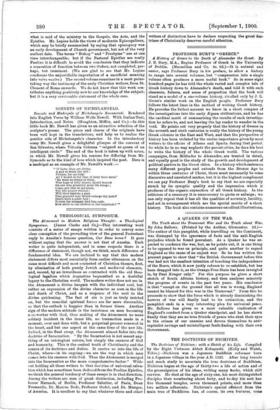PROFESSOR BURY'S "GREECE."
A History of Greece to the Death of Alexander the Great. By J. B. Bury, M.A., Regius Professor of Greek in the University of Dublin. (Macmillan and Co. 85. 6d.)—It is natural and easier, says Professor Bury in his preface, to allow a history to range into several volumes, but "compression into a single volume often produces a more useful book." So in some eight hundred pages he has told the whole varied and complex tale of Greek history down to Alexander's death, and told it with such clearness, fulness, and sense of proportion that the book will stand as a model of a one-volume history, rivalled only by J. R. Green's similar work on the English people. Professor Bury follows the latest lines in the method of writing Greek history. He provides the fullest account we know in a short compass of the investigations into the early Rgean civilisations, and he has the cardinal merit of summarising the results of each investiga- tion he refers to, and not leaving the lay reader to wander in the void. He points out very properly that the history of Greece in the seventh and sixth centuries is really the history of the young Greek colonies in the East and West, and that the perspective of history has been violated by the undue importance given by most writers to the affairs of Athens and Sparta during that period. So while he in no way neglects the parent-cities, he does his best to write the history of the whole Greek world. The various campaigns, from Miltiades to Alexander, are treated in detail, and equally good is the study of the growth and development of political parties in the Greek cities. In a history which embraces many different peoples and extends from the Bronze Age to within three centuries of Christ, there must necessarily be some discursive and unrelated matter, but it is the highest compliment we can pay Professor Bury's book to say that we are especially struck by its synoptic quality and the impression which it produces of the organic connection of all Greek history. lathe criticism of a summary it is unnecessary to quote or enlarge; we can only repeat that it has all the qualities of accuracy, lucidity, and art in arrangement which are the special merits of a short history. The book also contains numerous excellent illustrations.


































 Previous page
Previous page